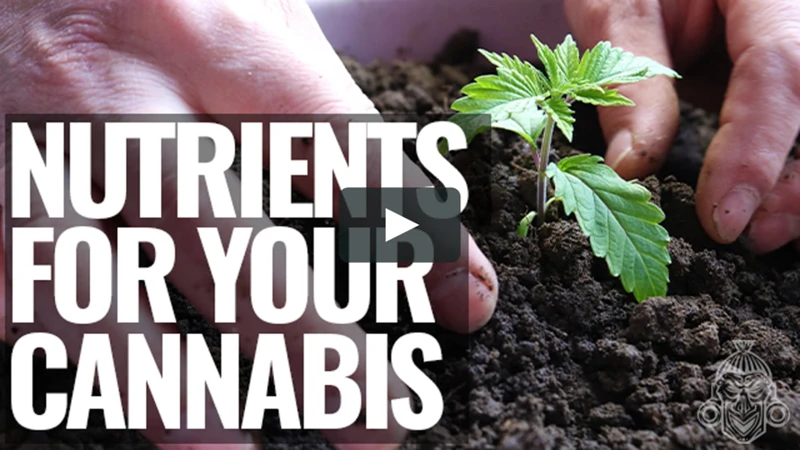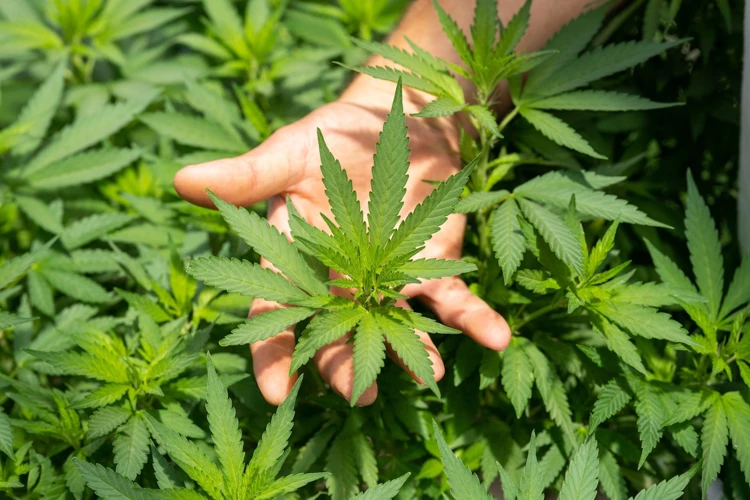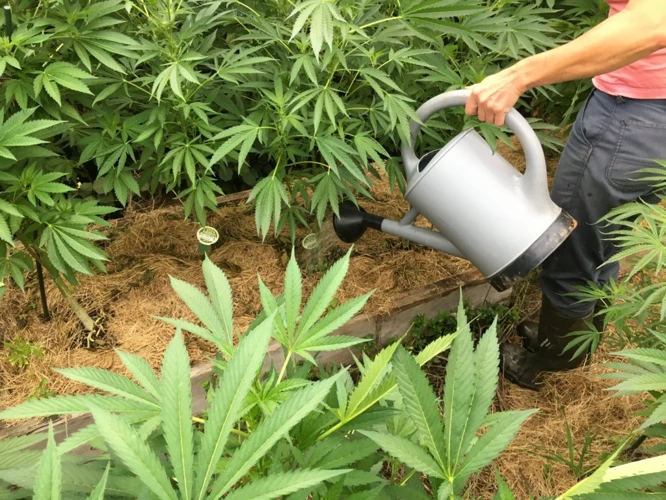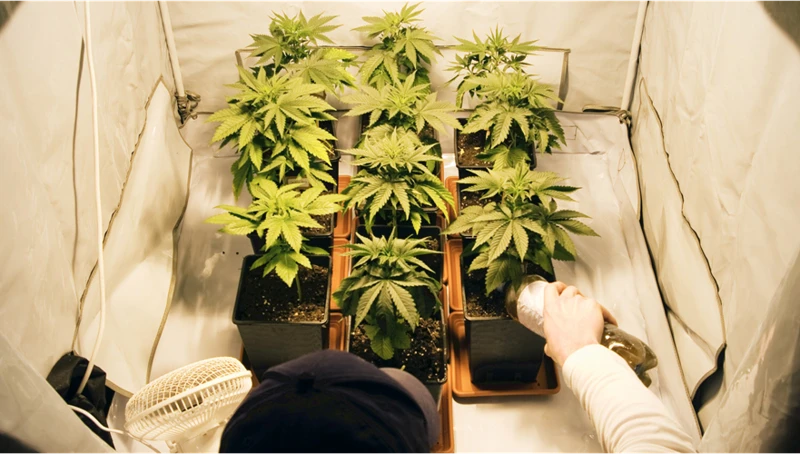
The Impact of NPK Ratio of Compost Tea on Cannabis Growth
Growing cannabis can be a challenging endeavor, and growers are always on the lookout for ways to improve the health and yield of their plants. One technique that has gained popularity in recent years is the use of compost tea as a natural fertilizer. But what is compost tea, and how can growers ensure they are using the optimal NPK ratio for their cannabis plants? In this article, we will explore the ins and outs of compost tea, its importance for cannabis growth, how to determine its NPK ratio, and the benefits and potential risks of using it.
What is Compost Tea?
Contents
Compost tea is an organic liquid fertilizer that is becoming increasingly popular among cannabis growers. It is made from steeping high-quality compost in water, which extracts the beneficial microorganisms and nutrients from the compost. The resulting liquid can provide a range of benefits to cannabis plants, including improved soil structure, increased nutrient uptake, and reduced need for chemical fertilizers. Understanding the process of making compost tea and its composition is crucial for any cannabis grower looking to optimize their plant growth. Let’s dive into the details of compost tea and how it can benefit your cannabis garden.
Composting Process
Composting is the natural process of decomposing organic materials into nutrient-rich soil. During this process, microorganisms, including bacteria and fungi, break down the organic matter into rich compost. Compost helps to improve soil health by adding nutrients to the soil and increasing water retention. There are two main types of composting: hot and cold.
Hot composting involves creating a large pile of organic matter, typically including a mix of green and brown materials such as yard waste, food scraps, and paper. The pile is then left to decompose, reaching high temperatures of up to 160°F (71°C) due to microbial activity. The high temperatures speed up the composting process, reducing the time it takes to produce compost.
Cold composting involves a slower process that doesn’t require the same level of maintenance as hot composting. Cold composting involves adding organic matter to a pile, typically in a corner of the garden, and letting it decompose over time. The process can take several months to a year to produce compost but requires little attention.
Compost can be made using a variety of organic materials such as leaves, grass clippings, food scraps, and sawdust. It’s important to note that certain materials, such as meat, bones, and dairy products, should not be added to compost as they can attract rodents and other unwanted pests. By properly composting organic matter, gardeners can create a nutrient-rich soil amendment that can be added to their garden beds to improve plant growth and overall soil health.
Making Compost Tea
Compost tea is a natural and nutrient-rich solution that can promote plant growth and improve soil health. Making your own compost tea is a simple process that can be done at home. Here are the steps for making compost tea:
- Collect compost: Collect black, crumbly compost that is free of any large debris or clumps. This will ensure that the compost tea is free of any physical contaminants that could harm plants.
- Create a compost tea bag: Fill a mesh bag with the collected compost. The mesh bag should be porous enough to allow the nutrients to leach out, but not so porous that the compost escapes from the bag.
- Add water: Fill a five-gallon bucket with water and add the compost tea bag to the bucket. Use dechlorinated water if possible, as chlorine can kill beneficial bacteria that live in the compost tea.
- Aerate: Attach an air pump (like those used for aquariums) to the bucket and turn it on. The air pump will help to oxygenate the water and promote the growth of beneficial bacteria and fungi.
- Brew: Allow the compost tea to brew for roughly 24-36 hours. During this period, the beneficial bacteria and fungi will multiply and the nutrients will leach out of the compost into the water.
- Strain: After the brewing period, remove the compost tea bag from the bucket and strain the liquid through a fine mesh strainer. This will remove any remaining solid particles and ensure that the compost tea is free of physical contaminants.
- Apply: The finished compost tea can be applied directly to plants as a foliar spray or soil drench.
Making compost tea is an easy and inexpensive way to provide your plants with nutrients and improve soil health. By following these steps, you can create a nutrient-rich solution that will benefit your garden for seasons to come.
The Importance of NPK Ratio for Cannabis Growth
When it comes to cultivating cannabis, the NPK ratio is a crucial factor that affects the growth and development of the plant. NPK refers to the three primary macronutrients that cannabis plants need: nitrogen (N), phosphorous (P), and potassium (K). Each of these nutrients plays a different role in the plant’s growth and overall health.
Nitrogen (N) is essential for the production of chlorophyll, which is necessary for photosynthesis. It also helps with the growth of leaves and stems, and overall plant size.
Phosphorous (P) is critical for the plant’s root development, energy storage and transfer, and photosynthesis. It is also involved in flower formation and seed production.
Potassium (K) helps regulate water balance in the plant, increases drought tolerance, and improves the overall quality of the flowers.
The NPK ratio in compost tea is crucial for ensuring optimal cannabis growth. If the balance of these three macronutrients is not appropriate, it can lead to nutrient deficiencies or wastage. For instance, too much nitrogen can lead to excessive vegetative growth, which can make the plants more susceptible to pests and disease. Conversely, too little nitrogen can cause stunted growth and yellowing of leaves.
Similarly, an excess of phosphorus can cause toxicity, while a lack can lead to slow growth and poor root development. In contrast, too much potassium can lead to potassium toxicity and decreased uptake of other minerals, while too little can lead to stunted growth and lower yields.
It is crucial to establish the appropriate NPK ratio in compost tea for optimal cannabis growth. In the next section of the article, we’ll discuss how to go about determining the NPK ratio in compost tea.
How to Determine the NPK Ratio of Compost Tea
Determining the NPK ratio of compost tea is an essential step in utilizing it for optimal cannabis growth. This step involves two crucial processes – testing compost tea and calculating the NPK ratio. It can be perplexing for those who are new to compost tea production, but with the right guidance and tools, it can be easily accomplished. Let’s delve into the details of both processes in this section.
Testing Compost Tea
Before applying compost tea to cannabis plants, it is important to test it to determine its NPK ratio. Testing the compost tea can help ensure that the plants are getting the right nutrients and can prevent over-fertilization.
The following table outlines the steps for testing compost tea:
| Step | Description |
|---|---|
| Step 1 | Collect a sample of the compost tea in a clean container. |
| Step 2 | Use a pH test kit to determine the pH of the compost tea. The optimal pH range for cannabis plants is 6.0 to 7.0. |
| Step 3 | Use a TDS meter to determine the total dissolved solids (TDS) of the compost tea. The TDS should be between 500 and 1500 parts per million (ppm). |
| Step 4 | Send a sample of the compost tea to a lab for analysis to determine the NPK ratio. This can be done by using a soil testing lab or a cannabis-specific testing lab. The lab will provide a report with the NPK ratio as well as other important nutrient levels. |
Testing the compost tea ensures that it is properly balanced for optimal cannabis growth. By knowing the pH and TDS levels, growers can adjust the compost tea accordingly. If the pH is too high or too low, amendments such as vinegar or baking soda can be added to adjust the pH. If the TDS is too low, additional compost or other organic fertilizers can be added to increase nutrient levels.
It is important to note that compost tea should not be used if it has an unpleasant odor, as this can indicate the presence of harmful pathogens. Testing the compost tea ensures that it safe and effective for use on cannabis plants.
Calculating NPK Ratio
To calculate the NPK ratio of compost tea, you’ll need to take a sample of the tea and send it to a lab for analysis. This can be quite expensive and time-consuming, so there are several other methods that you can use to estimate the NPK ratio of your compost tea.
Method 1: Using Fertilizer Labels
One of the easiest ways to estimate the NPK ratio of your compost tea is to look at the labels of the fertilizers that you used to make the tea. Most fertilizer labels will list the NPK ratio in the order of nitrogen, phosphorus, and potassium. If you know the exact amounts of each fertilizer you used and the recipe you followed to make the tea, you can estimate the NPK ratio based on the fertilizer labels.
Method 2: Using a TDS Meter
Another method to estimate the NPK ratio of your compost tea is to use a Total Dissolved Solids (TDS) meter. This tool measures the electrical conductivity of the tea, which can be used to estimate the nutrient concentration. While TDS meters won’t give you an exact NPK ratio, they can help you track changes in the nutrient levels over time.
Method 3: Using an EC Meter
An EC (Electrical Conductivity) meter is similar to a TDS meter, but it specifically measures the concentration of ions in the solution. This can give you a more accurate estimation of the nutrient levels in your compost tea. To use an EC meter, you’ll need to calibrate it first and then take a sample of your compost tea to measure.
Method 4: Consulting with Experts
If you’re really struggling to estimate the NPK ratio of your compost tea, you could consider consulting with experts in the field. This could include local horticulturalists, extension offices, or even online forums. Getting advice from experienced growers can be invaluable when it comes to optimizing your NPK ratio for cannabis growth.
While it can be challenging to estimate the NPK ratio of compost tea, there are several methods available that can help. By regularly testing and monitoring your compost tea, you can ensure that you’re giving your cannabis plants the optimal nutrient balance they require for healthy growth.
The Optimal NPK Ratio for Cannabis Growth
Cannabis plants require a specific balance of nutrients for optimal growth, and this balance can be determined by the NPK ratio. NPK stands for nitrogen (N), phosphorus (P), and potassium (K), which are the three primary nutrients that plants need. The NPK ratio is a measure of the proportion or ratio of these three nutrients in a fertilizer or soil amendment.
Nitrogen (N) is important for cannabis plants’ vegetative growth, as it is necessary for the development of leaves and stems. It also aids in the production of chlorophyll, which is essential for photosynthesis. Too much nitrogen can lead to excessive vegetative growth, which can reduce yields, delay flowering, and make plants more susceptible to pests and diseases.
Phosphorus (P) is crucial for cannabis plants’ reproductive growth, as it aids in the development of roots, flowers, and fruit. It is also necessary for energy transfer within the plant. Too little phosphorus can lead to stunted growth, poor bud development, and reduced yields.
Potassium (K) is important for cannabis plants’ overall health and stress resistance. It aids in photosynthesis, water uptake, and the regulation of plant processes. It can also improve the quality of flowers and increase resin production. Too little potassium can make plants more susceptible to stress and disease.
The optimal NPK ratio for cannabis growth depends on the stage of growth. During the vegetative stage, a higher amount of nitrogen is needed, so an NPK ratio of around 3-1-2 is ideal. During the flowering stage, a higher amount of phosphorus is needed, so an NPK ratio of around 1-3-3 is ideal. However, it is important to note that these ratios can vary depending on the strain and growing conditions.
To determine the NPK ratio of compost tea, it is important to test the tea and calculate the ratio based on the nutrient content. Once determined, the NPK ratio can be adjusted as needed for the different stages of plant growth.
Using compost tea with the optimal NPK ratio for cannabis growth can lead to healthier plants, higher yields, and improved quality. It is a natural and sustainable way to provide plants with the nutrients they need, without relying on harmful chemicals.
Applying Compost Tea to Cannabis Plants
After determining the optimal NPK ratio of compost tea for cannabis growth, the next step is applying it to your plants. However, this process can be confusing for those who are new to using compost tea as a fertilizer. There are certain factors to consider, including frequency, amount, and application methods. In this section, we will explore the best practices for applying compost tea to your cannabis plants to achieve optimal growth and yield.
Frequency and Amount
The Frequency and Amount of Applying Compost Tea to Cannabis Plants
When it comes to applying compost tea to cannabis plants, there are a few key factors to consider: frequency, amount, and method of application. The frequency of application will depend on various factors, such as plant age, growth stage, and environmental conditions. Additionally, the amount of compost tea to apply will depend on the size of the plants and their nutrient requirements.
To help determine the appropriate frequency and amount of compost tea application, a good starting point is to test the soil and plants regularly. This can help identify any deficiencies or excesses in nutrients, and adjust the compost tea application accordingly.
Frequency
In general, it is recommended to apply compost tea to cannabis plants every 1-2 weeks during the vegetative stage, and every 2-3 weeks during the flowering stage. However, this can vary depending on the plant’s individual needs and the environmental conditions.
Amount
The amount of compost tea to apply will depend on the size of the plants and their nutrient requirements. A general rule of thumb is to apply 1-2 gallons of compost tea per 100 square feet of soil surface area. This can be adjusted based on the size and nutrient needs of the plants.
To further help determine the appropriate amount of compost tea, it is important to calculate the NPK ratio of the compost tea. This can help ensure that the plants are receiving the proper balance of nutrients.
Method of Application
There are several ways to apply compost tea to cannabis plants, such as foliar spraying, soil application, and root drenching. The method of application will depend on the individual plant’s needs and environmental conditions.
Conclusion
Applying compost tea to cannabis plants can provide many benefits, such as improved soil structure, increased microbial activity, and reduced need for chemical fertilizers. By considering the frequency and amount of compost tea application, growers can help ensure optimal growth and nutrient uptake in their cannabis plants.
Using Compost Tea as Fertilizer
Using compost tea as a fertilizer is a popular method for promoting optimal growth of cannabis plants. Here are some tips on how to use compost tea effectively as a fertilizer:
- Use compost tea as a soil drench: You can use compost tea as a soil drench by pouring the tea directly onto the soil at the base of the plants. This method is effective in providing the plants with the nutrients they need directly through the soil.
- Use compost tea as a foliar spray: Another way to use compost tea is as a foliar spray, which involves spraying the tea directly onto the cannabis plant leaves. This method is effective in providing the plant with quick access to the nutrients, but care must be taken to ensure that the plant is not over-sprayed as this can cause damage.
- Make sure that the compost tea is properly brewed: It is important to brew the compost tea properly to ensure that it contains the right nutrients and is not contaminated. A properly brewed compost tea should be aerated for at least 24 hours and should not have a foul smell.
- Apply compost tea regularly: To see optimal results, it is important to apply the compost tea regularly. This will ensure that the plants have a consistent source of nutrients that they need to grow and thrive.
- Use compost tea in conjunction with other fertilizers: While compost tea can be a great standalone fertilizer, it is also effective when used in conjunction with other fertilizers. This can help to provide the plants with a wider range of nutrients, which can ultimately lead to healthier, more vibrant cannabis plants.
Using compost tea as a fertilizer is an inexpensive and effective way to promote optimal growth of cannabis plants. By following these tips and using compost tea as part of a comprehensive fertilization plan, growers can help to ensure that their plants receive the necessary nutrients to grow and thrive.
Benefits of Using Compost Tea for Cannabis Growth
When it comes to growing cannabis, using chemical fertilizers can harm both the plant and the environment. By switching to organic methods, you can not only produce healthier plants but also improve the soil quality. Compost tea, a nutrient-rich liquid made from organic matter, is an excellent alternative. This natural fertilizer has numerous benefits and can be easily applied to your cannabis plants. Let’s explore the advantages of using compost tea and how it can boost your cannabis growth.
Improves Soil Structure
Compost tea is a natural fertilizer and soil conditioner that can improve the overall structure of the soil. Compost tea contains a variety of beneficial microorganisms that help to break up compacted soil and improve the soil’s ability to absorb water and nutrients.
Here are some ways that compost tea can improve soil structure:
- Increases soil porosity: Compost tea can help to increase soil porosity by improving soil aggregation. The microorganisms in compost tea produce sticky substances that bind soil particles together, creating larger aggregates. This creates more space in the soil for air and water to move through, which helps roots to grow and absorb nutrients more easily.
- Reduces soil compaction: Compost tea can help to reduce soil compaction by breaking up hard, dense soil. The microorganisms in compost tea produce enzymes that can break down soil particles, making the soil less compacted and easier for roots to penetrate.
- Improves water absorption: Compost tea can improve water absorption by increasing soil porosity and reducing soil compaction. When soil is less compacted and has more space, it can absorb water more easily. This can help to reduce the need for frequent watering and prevent soil erosion.
- Increases nutrient availability: Compost tea can increase nutrient availability in the soil by enhancing the activity of beneficial microorganisms that break down organic matter into nutrients that plants can use.
By improving soil structure, compost tea helps to create an optimal environment for cannabis plants to grow and thrive. It’s important to note that the effects of compost tea on soil structure are not immediate and may take several applications over time to see significant results. However, the long-term benefits of using compost tea for soil structure can be substantial, leading to healthier plants and improved yields.
Encourages Beneficial Microorganisms
When it comes to using compost tea for cannabis growth, one of the major benefits is that it encourages beneficial microorganisms in the soil. These tiny organisms play a crucial role in the health and vitality of plants.
Some of the microorganisms commonly found in compost tea include bacteria, fungi, protozoa, and nematodes. These microorganisms are beneficial to plants because they help to break down organic matter, making it more available to plant roots.
These microorganisms can help protect plants from harmful pathogens and pests. They do this by colonizing the roots and leaves of plants, making it more difficult for harmful microorganisms to take hold.
By incorporating compost tea into your cannabis growth regimen, you can effectively boost the population of beneficial microorganisms in your soil. This can lead to healthier plants, bigger yields, and greater resistance to pests and diseases.
Here are some specific ways that compost tea encourages beneficial microorganisms:
- Increase Microbial Diversity: Compost tea contains a diverse range of microorganisms, which helps to increase the overall microbial diversity in the soil. This increased diversity can help improve soil structure and fertility, making it easier for plants to grow and thrive.
- Repopulate Soil: Over time, the use of chemical fertilizers and pesticides can deplete the population of beneficial microorganisms in the soil. Compost tea can help repopulate the soil with these microorganisms, restoring the soil’s natural balance.
- Provide Nutrients: Microorganisms in compost tea can help break down organic matter in the soil, making it more available to plant roots. This can provide plants with the essential nutrients they need for healthy growth.
- Suppress Harmful Pathogens: Some of the microorganisms found in compost tea have been shown to have suppressive effects on harmful pathogens, such as Fusarium and Pythium. This can help protect plants from disease and reduce the need for chemical pesticides.
The encouragement of beneficial microorganisms is an essential benefit of using compost tea for cannabis growth. By creating a healthy, diverse soil ecosystem, you can help your plants grow stronger, healthier, and more resilient to pests and diseases.
Reduces Need for Chemical Fertilizers
One of the biggest benefits of using compost tea for cannabis growth is that it can reduce the need for chemical fertilizers, which can be harmful to both the environment and the overall health of the plants. Chemical fertilizers can often contain high levels of salts and other chemicals that can be damaging to the soil and the microorganisms that live within it.
By using compost tea as a natural alternative, you can provide your cannabis plants with the necessary nutrients they need to thrive, without the harmful side effects. Compost tea contains a wide range of essential nutrients, including nitrogen, phosphorus, and potassium, that are released slowly over time, providing a consistent supply of nutrients to the plants.
This can save you money in the long run, as you won’t need to continually purchase expensive chemical fertilizers. Additionally, using compost tea can promote overall plant health, leading to stronger and more resilient plants that are more resistant to disease and pests.
In contrast, chemical fertilizers can often lead to an overabundance of certain nutrients, which can cause imbalances in the soil and actually harm the plants. By using compost tea, you can ensure that the nutrients are delivered to the plants in a balanced and natural way.
Using compost tea can reduce your reliance on harmful chemical fertilizers, promote a healthy growing environment for your cannabis plants, and save you money in the long run.
Potential Risks of Using Compost Tea for Cannabis Growth
While compost tea is generally safe and beneficial for cannabis growth, there are some potential risks that growers should be aware of. One risk is contamination with harmful pathogens, such as E.coli, salmonella, or listeria, which can cause illness in both plants and humans. This can occur if the compost used to make the tea was not properly processed, or if the tea is made in unsanitary conditions.
Another risk is over-fertilization, which can occur if too much compost tea is applied to the plants or if the tea has a high NPK ratio. Excessive nutrients can cause nutrient burn in the plants, stunting growth and damaging the foliage. It is important for growers to carefully monitor the NPK ratio of their compost tea and to adhere to proper application rates.
Additionally, if the compost used to make the tea contains heavy metals or other contaminants, those pollutants may be present in the tea as well. This is why it is important to use compost that has been properly tested and screened for contaminants before using it to make tea.
Finally, growers should be cautious about using compost tea during the flowering stage, as it may encourage vegetative growth and delay the onset of flowering. It is generally recommended to stop using compost tea once the plants begin to flower, to avoid interfering with the natural growth cycle.
While the benefits of using compost tea for cannabis growth are many, growers should take care to mitigate potential risks and use it responsibly.
Conclusion
In summary, understanding the NPK ratio of compost tea is crucial for optimizing cannabis growth. Compost tea is a natural, organic fertilizer that can provide cannabis plants with a balanced blend of nutrients and beneficial microorganisms.
By following the proper process of creating compost tea, including proper composting techniques and testing the tea for its NPK ratio, growers can ensure that their cannabis plants receive the optimal NPK balance they need to thrive.
Applying compost tea to cannabis plants can help improve soil structure, encourage beneficial microorganisms, and reduce the need for chemical fertilizers. However, it’s important to understand the potential risks of using compost tea, such as the possibility of introducing harmful pathogens or over-fertilization.
Overall, compost tea is a sustainable, eco-friendly option for cannabis growers, and understanding its NPK ratio is essential for achieving successful and healthy plant growth. As with any fertilizer or growing technique, it’s important to research and experiment with different methods to find what works best for your specific cannabis strains and growing conditions.
Frequently Asked Questions
What is the difference between compost and compost tea?
Compost is decomposed organic material, while compost tea is a liquid solution made by steeping compost in water.
Can compost tea help prevent plant diseases?
Yes, compost tea can help prevent plant diseases by encouraging the growth of beneficial microorganisms that compete with harmful ones.
What does NPK ratio mean?
NPK ratio refers to the ratio of nitrogen (N), phosphorus (P), and potassium (K) in a fertilizer or soil amendment. It indicates the relative amounts of these nutrients present.
How can I test the NPK ratio of my compost tea?
You can test the NPK ratio of your compost tea with a simple home testing kit, or by sending a sample to a lab for analysis.
What is the optimal NPK ratio for cannabis growth?
The optimal NPK ratio for cannabis growth may vary depending on the stage of growth and the specific strain, but generally a ratio of around 3:1:2 (N:P:K) is recommended.
How often should I apply compost tea to my cannabis plants?
Cannabis plants generally benefit from regular applications of compost tea, which can be applied every 1-2 weeks.
How much compost tea should I use on my cannabis plants?
The amount of compost tea to use on cannabis plants depends on various factors, such as the size of the plant and the strength of the tea. A general guideline is to use 1-2 cups per plant per application.
Can I use chemical fertilizers in addition to compost tea?
Yes, you can use chemical fertilizers in addition to compost tea, although it is generally not necessary and can potentially harm the beneficial microorganisms in the tea.
What are some benefits of using compost tea for cannabis growth?
Benefits of using compost tea for cannabis growth include improving soil structure, encouraging beneficial microorganisms, and reducing the need for chemical fertilizers.
Are there any risks associated with using compost tea for cannabis growth?
There is a slight risk of pathogen growth if the compost tea is not brewed properly or if contaminated compost is used, but this can be avoided with proper preparation and storage.








